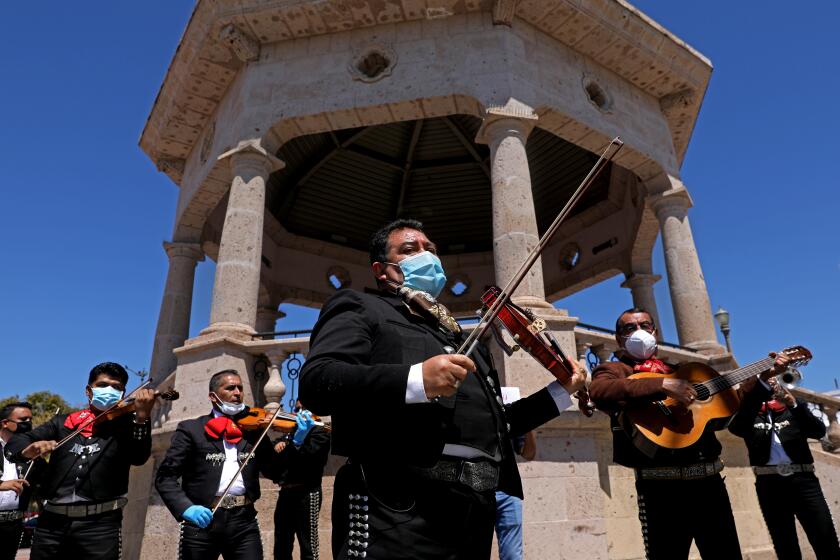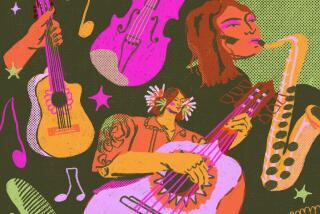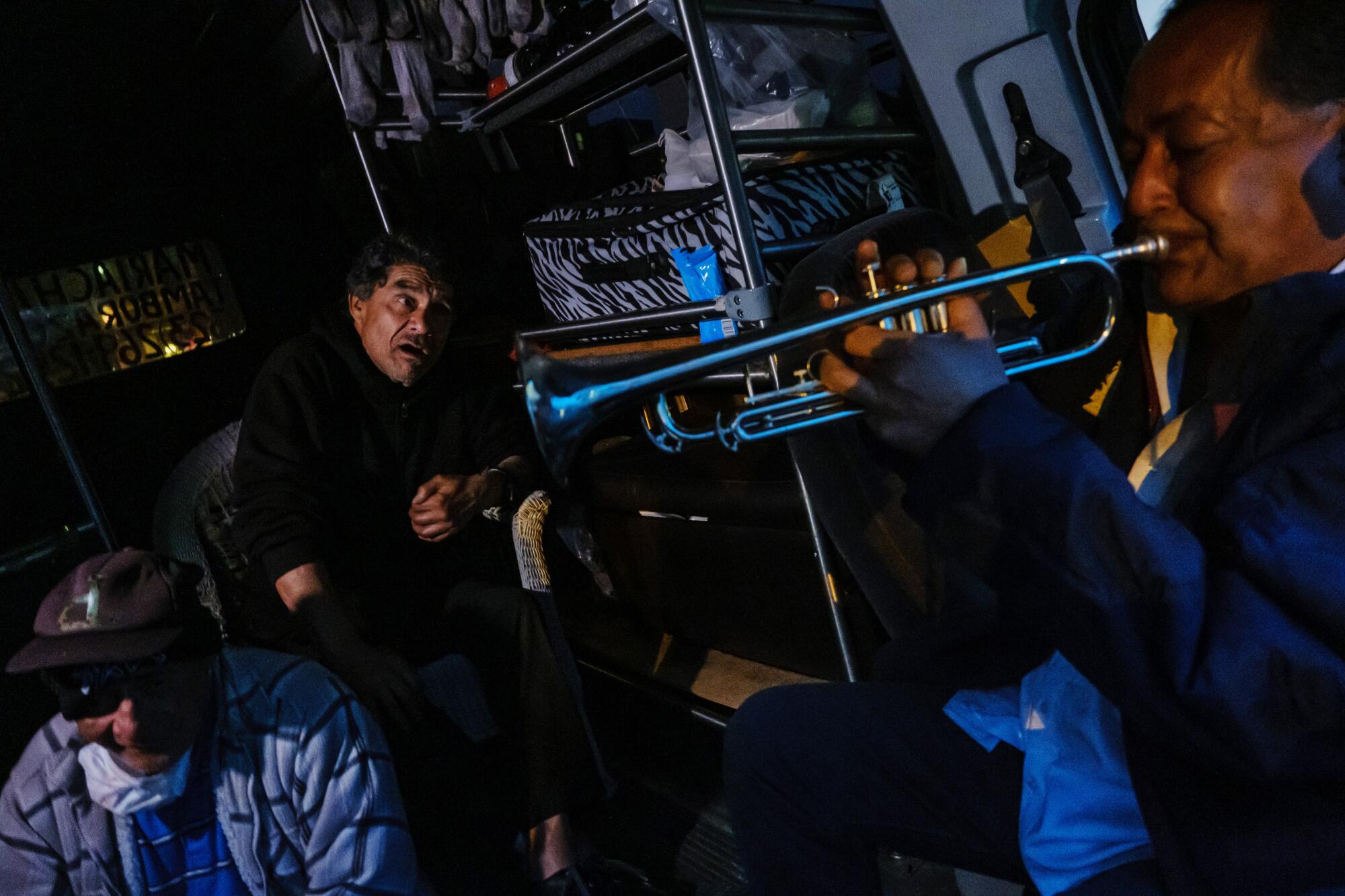
- Share via
Pedro Zamora grabbed his silver trumpet and began to play a song inside his new home — an airport shuttle bus.
There had been no work for more than a month, and the 68-year-old mariachi musician could not pay the $650 it costs to rent his room in Boyle Heights. Despite an eviction ban, Zamora said, his landlord demanded the money, so he borrowed $250 from his son and moved into the black “Auto Airport Parking” shuttle stationed outside of Mariachi Plaza.
Like many mariachis across the United States, Zamora had been living off the cadences of life. Mariachis play love songs at wedding receptions, songs about Mexico at festivals and dance halls; they sing birthday songs at parties and morning serenades on Mother’s Day. They subsist on joy, but they also experience sadness, upon occasion, as they witness the last goodbyes at funerals.
Then came the novel coronavirus, which choked off almost every source of revenue for the musicians who have been plying their trade, from L.A. to Texas and beyond. Stress came in waves. A medical condition made Zamora grind his teeth, conjuring a groaning sound like that of a tree bending on a windy day.
“I only have a dollar in my pocket,” Zamora said. “I don’t know how I am going to survive this.”
Part of the gig
For nearly a century, mariachis hoping to be hired have made the plaza their home. Economic struggles, like sad songs, were part of the gig. Even in the best of times, a job was never guaranteed.
In recent years, higher rents and the specter of gentrification have always loomed as both physical and existential threats. Some mariachis lost their housing during the renovation of the Boyle Hotel, a historic brick building that sits across the plaza.
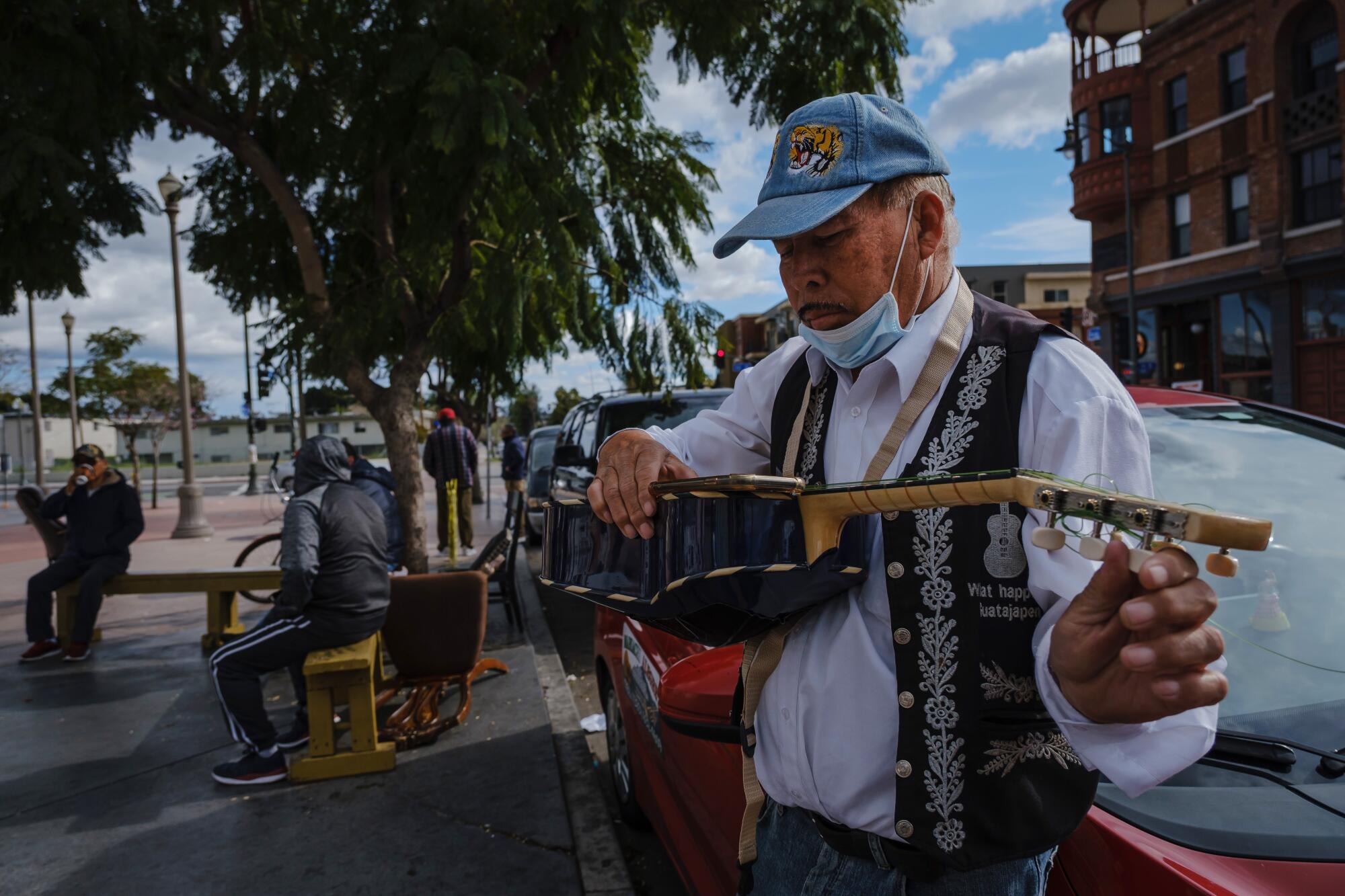
The Great Recession of 2008 hit them hard. So did construction at the Metro light rail station where the plaza lies.
It’s not an easy life but mariachis have persevered because of their love for their music — and what they represent. They are a symbol of Mexican identity and pride and many of their ballads celebrate the struggles, joys and growth of the Mexican people. Others speak of loves won and lost.
But whether the mariachis are singing about heartache or the motherland, jubilance often follows in their wake. Performances that start table-side can take over an entire restaurant or party.
The diversity of everyday events where mariachis are hired to play is expansive. In the landscape of musicians in America, perhaps only brass bands in places such as New Orleans follow a similar path, hired for weddings, funerals, birthday parties and backyard celebrations.
But the coronavirus outbreak has shut down most of these events. The risk is too high for guests and for the musicians, who are often older and may have underlying health conditions that make them more vulnerable.
On a recent Wednesday afternoon, next to the plaza, near Boyle Avenue and First Street, Santos Monge, 58, sat in his car watching a Spanish movie on his cellphone. A green bottle filled with rubbing alcohol lay on the passenger seat. Sometimes, when he is out of the car, he walks around with it, spraying himself as if it was cologne.
These days Monge, who suffers from diabetes and plays the vihuela, or a small guitar, doesn’t want to think much about the future.
“I get anxious. I start to feel depressed,” he said. “I don’t want to think about what may happen. I’ll spiral and get mentally ill just thinking, ‘What if I get sick, what if my children get sick, or my grandchildren.’ And if I get sick with the coronavirus, I’m in real trouble.”
Arturo Ramirez, president of the Los Angeles United Mariachis Organization, said that before the coronavirus outbreak, mariachis at the plaza would typically get up to four gigs a week, making anywhere from $300 to $400. But it’s been several weeks since some of the musicians last worked.
When they are able to find work, Ramirez said the mariachis are having to adjust to social distancing, standing several feet apart from one another when they perform. The last time he was hired, Ramirez said, his band had to stand 15 feet away from a home as they sang “Las Mañanitas,” a traditional birthday song, to a woman.
“Even though we know there’s not much work, we have to keep hopeful that someone will hire us,” Ramirez said. “An hour or two is enough to provide us with some relief for at least a day or so.”
As a group, he says the musicians were not financially prepared for the downturn caused by the pandemic. Now the bills are piling up, food is running out and there is little reason to think the future will be anything but grim. Ramirez said that about 10 mariachis who travel from Mexico to Boyle Heights to find seasonal work, from March through June, decided to go home.
“There is nothing out there,” Ramirez said. “Absolutely nothing. Zero.”
All he can do is hope that he and the others will do better about putting money aside — if they survive an economy tipping into recession.
“Frankly, it’s a discussion that needs to be had.”
Many of the mariachis say they don’t know if they are eligible for unemployment or a stimulus check. They work irregular hours, and some of them don’t have legal status in the country. Ramirez said things have become so dire that he wrote L.A. Mayor Eric Garcetti and asked for help. A few days later, Gavin Newsom announced a $125-million relief effort for immigrants without legal status, but it’s unclear which organization will help the mariachis apply for the financial aid.
“We’re in limbo,” he said. “We don’t know what will happen in May.”
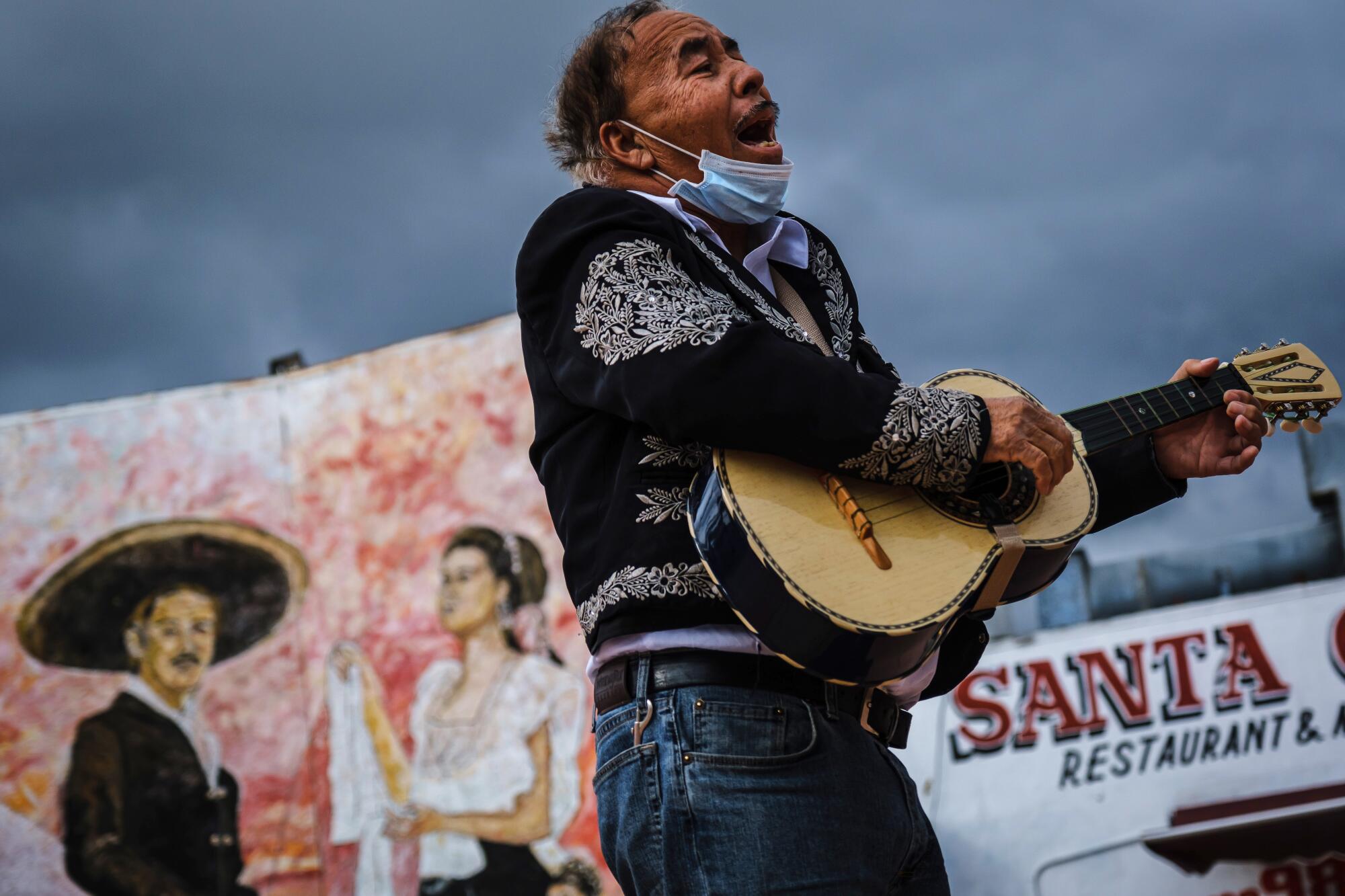
Some of the musicians say they aren’t even looking that far ahead. They wonder if they can make it through April.
Even if the stay-at-home orders are lifted soon, they wonder about how quickly the economy will recover. How soon will people want to hire musicians? How soon will people feel both safe and want to celebrate something — anything?
“It’s not like we’re going to get back to normal right away,” Monge said. “People are going to be too scared to gather and people may not have money to hire us.”
Monge, who lives with his girlfriend in a small room that costs $700 a month, couldn’t pay his rent at the beginning of April. He said they were almost out of food but he’d been able to pick up snack packs and other items in a food giveaway. Three plastic bags filled with cartons of chocolate milk, apples, carrots and bread sat behind the driver’s seat.
His landlord, Monge said, told him that the rent would not be collected until he finds steady work. It is a welcome reprieve, but it hasn’t stopped his debts from ballooning. By the end of next month, he said he would owe two months of rent as well as his monthly car payment and insurance. In all, he will owe $2,600.
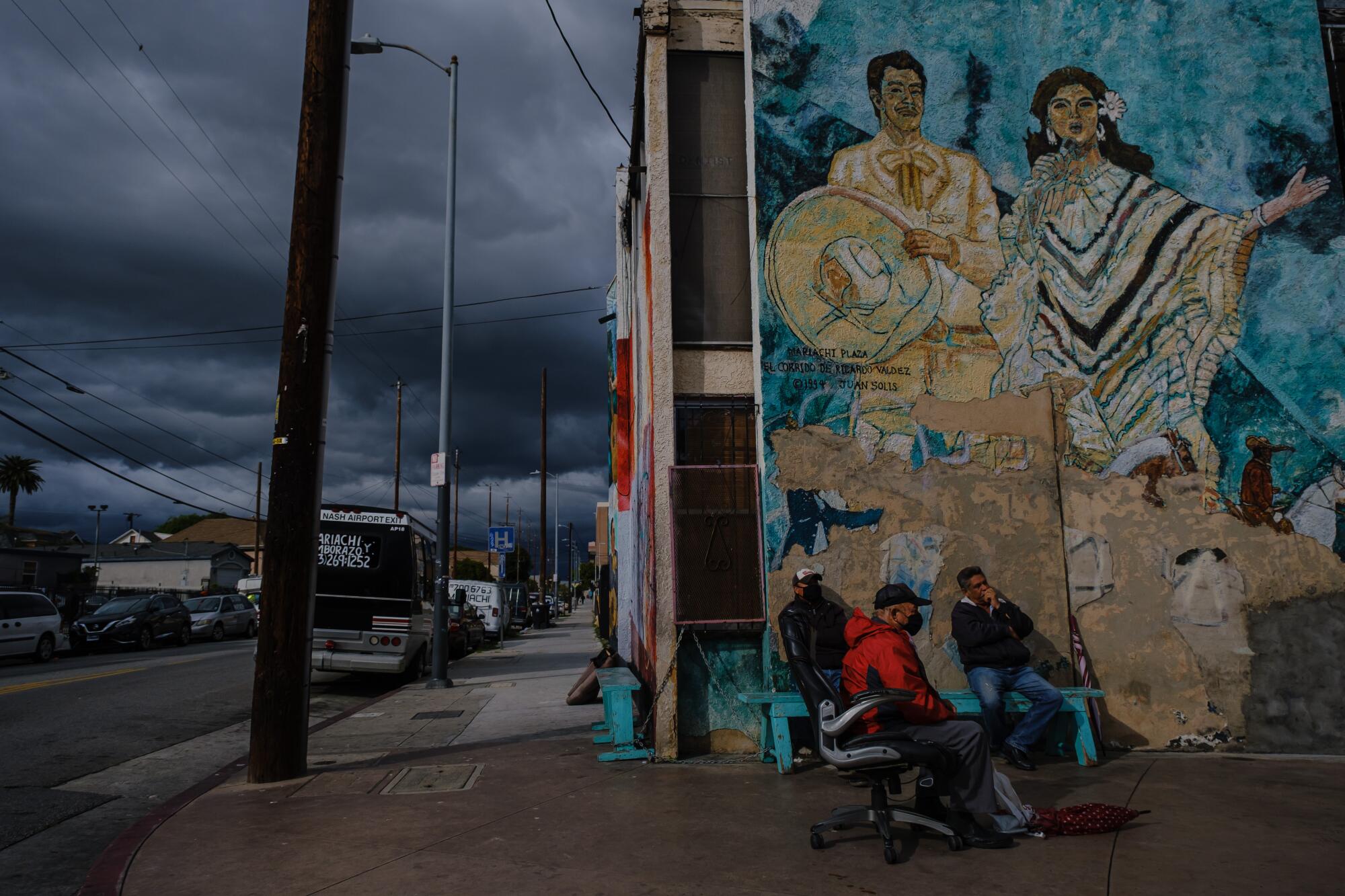
“Everybody is indoors. Everything is almost closed,” he said. “There’s nothing we can do.”
A few weeks back, Monge was driving cars from one dealership to another on a part-time basis. But he lost that job when the pandemic hit.
“I can sweep and drive,” he said. “I’ll take any job right now, but I can’t do construction. When I was younger I could, but not now.”
Monge said the days of doing nothing make him think of “Que suerte la mía,” or “Such My Luck,” a mariachi song that is infused with sadness. He started to sing with his soft, raspy voice.
Just my luck, to suffer once more after having suffered
What sad agony, to fall once more after having fallen before
Just my luck, to lose once more after having lost before
The musicians are seeking as financial assistance during COVID-19 pandemic
The itinerant worker
Back at the shuttle that same Wednesday afternoon, Zamora sat in the driver’s seat, practicing his trumpet while half a chicken sat on a cup holder. He’d purchased the chicken the day before and had a neighbor warm it up.
Zamora was 17 when he came from Mexico to the United States to work as a mariachi.
He traveled to Chicago, New York, Detroit and eventually settled in Los Angeles at the age of 30. He usually made enough money as a mariachi to cover his essential expenses and would send anything extra to his wife and four children in Mexico.
“I gave everything to my kids,” he said. “I kept nothing.”
In 2011, his wife, who suffered from diabetic kidney disease, died. One of his daughters died soon after. Despite the hard times, Zamora said he was able to keep working. Until now.
Salsa music, with its large bands and close dancing, has a devoted following in L.A., but its very nature makes it especially susceptible to the ravages of the coronavirus.
For the first time in his life, he is worried about surviving. He’s not sure he will be able to keep renting the shuttle bus from a neighbor and fears he may end up homeless. He figured he could maybe visit his children in Los Angeles and spend a few days with them, but their apartments are already overcrowded.
Around 7 p.m., as storm clouds passed over the city, two other mariachis joined Zamora in the shuttle.
Arturo Ramos, 51, took over the driver’s seat. A year ago, he started to try and save money so he could return to his home in Michoacan, Mexico, to visit his mother, who is ill. But his green card will expire in November and the pandemic has made travel planning difficult. Ramos decided that he wasn’t going anywhere. He couldn’t risk losing his residency.
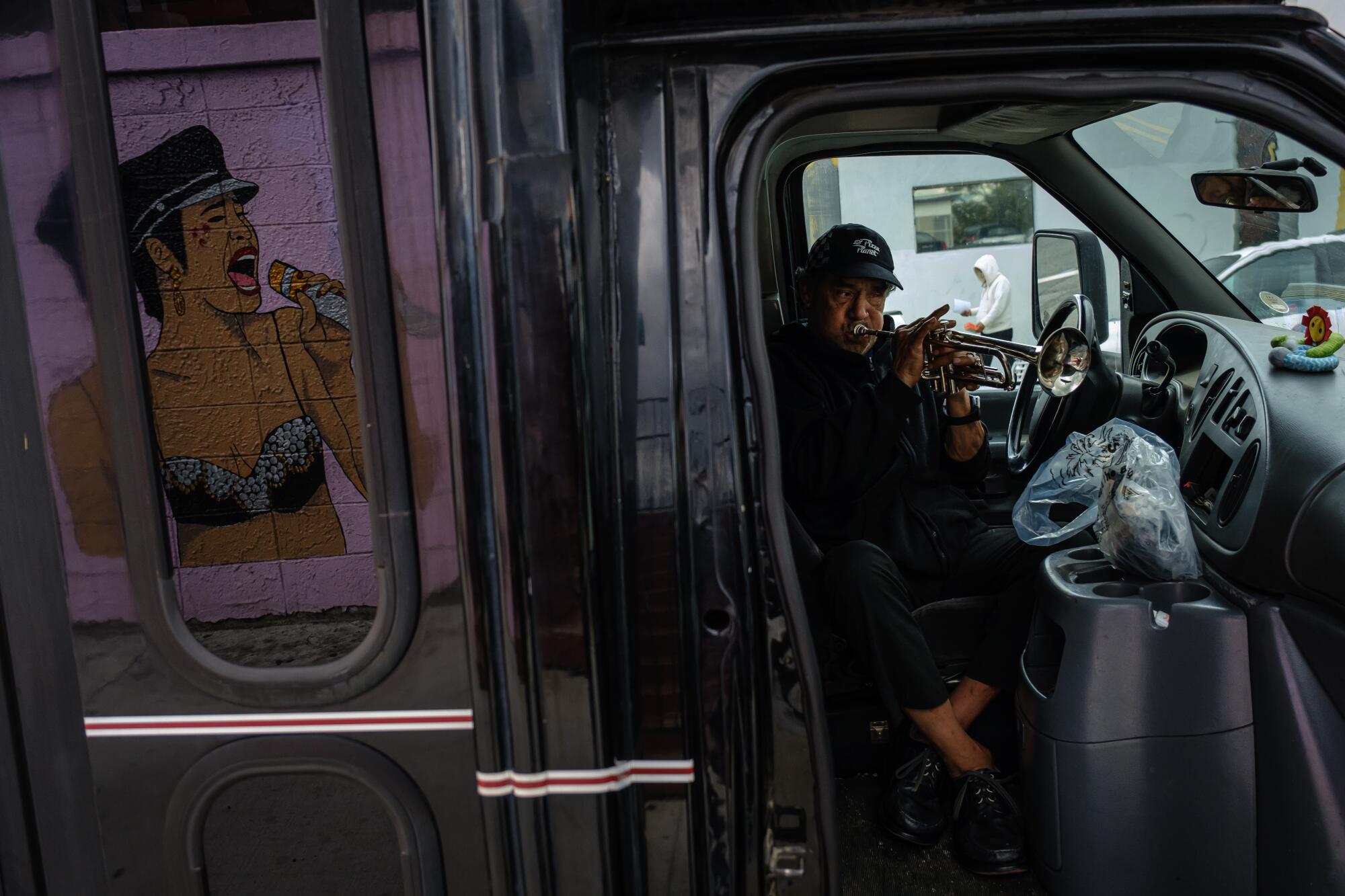
Until recently, Ramos, a trumpeter, had worked seasonal jobs as a mariachi and a grape picker in Napa Valley. But he hasn’t been able to find work throughout the state for weeks.
His landlord said he could start paying his $400 monthly rent when he gets steady work again. But Ramos fears he will never recover from the dark hole in which he and so many others sit.
“I’m going to be stuck in a bad cycle.”
More to Read
Sign up for Essential California
The most important California stories and recommendations in your inbox every morning.
You may occasionally receive promotional content from the Los Angeles Times.
